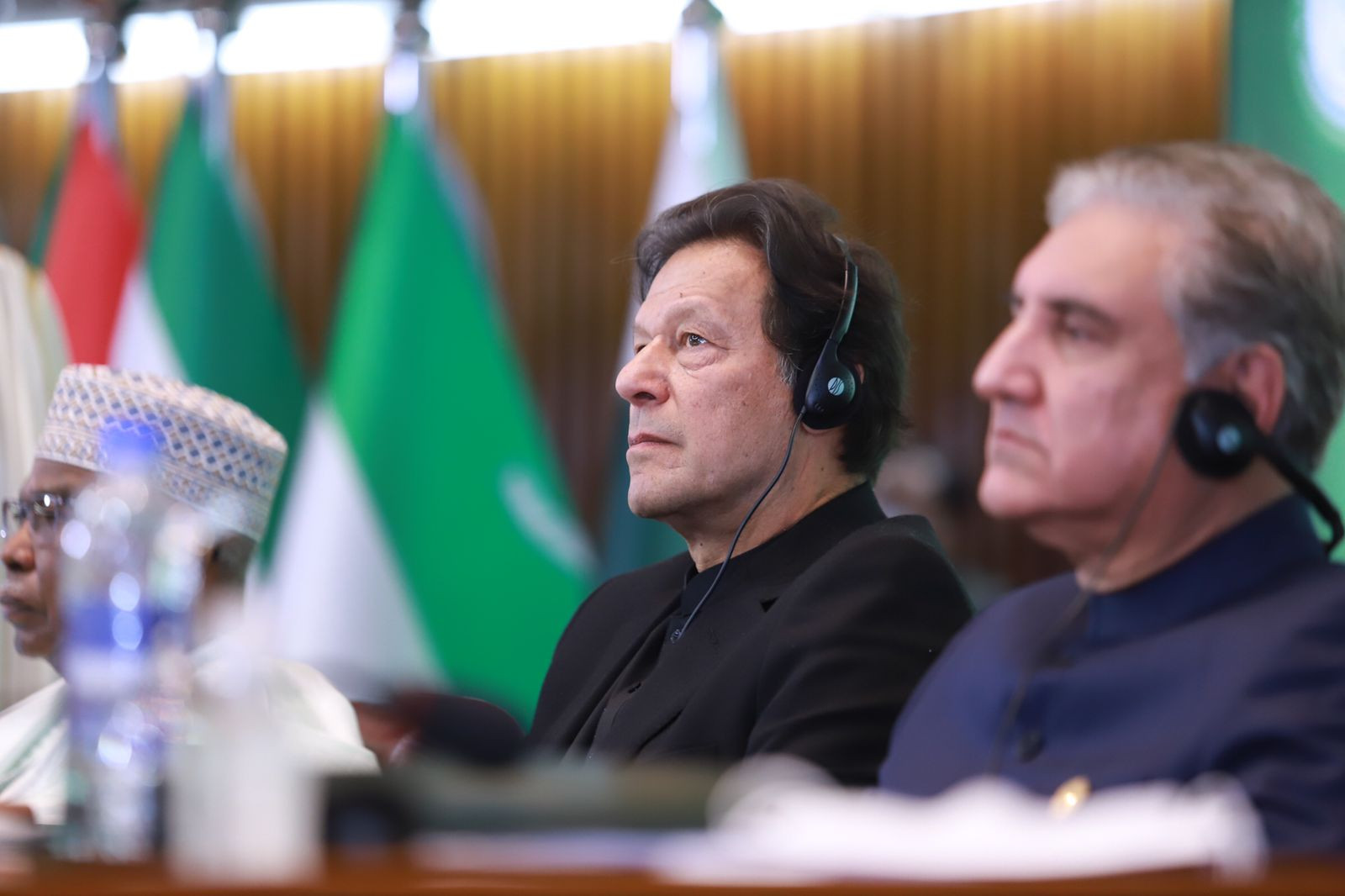
The Organisation of Islamic Cooperation (OIC) on Sunday set up a humanitarian fund to be operated by the Islamic Development Bank (IDB) to help avert the humanitarian and economic crises in Afghanistan, as Prime Minister Imran khan warned that the neighbouring country could potentially become the “biggest man-made crisis” if the world did not act.
The announcement of the fund was part of the measures the 57-member Islamic bloc agreed upon after the 17th Extraordinary Session of the Council of Foreign Ministers of Organisation of Islamic Cooperation (OIC) hosted by Pakistan. However, it is unclear if the decisions made by the OIC will make an immediate impact on the ground in Afghanistan, which is in dire need of humanitarian assistance.
The humanitarian fund would channel financial assistance to be provided by member states to Afghanistan.
The reason the trust fund has been set up is to establish a channel through which assistance could be provided to the people of Afghanistan. Currently, because of the sanctions imposed by the US and other Western countries, there are no formal banking channels or financial system operating in Afghanistan.
In the absence of formal banking channels, the countries interested in helping the people of Afghanistan are finding it difficult to do so.
Foreign Minister Shah Mahmood Qureshi, who held a joint news conference along with OIC Secretary General Hissein Brahim Taha, said the establishment of a trust fund would help address that problem.
However, no pledges or donations were made yet to the newly created fund as Qureshi said the fund was just announced and hopefully member countries would start contributing to it soon.
He also admitted that another reason the fund was set up was because some of the member countries were not willing to channel assistance through the Taliban government. The OIC secretary general appointed a special envoy on Afghanistan, who would make sure the decisions made at the Islamabad conference were fully implemented. Over 20 foreign ministers including those from Saudi Arabia, Turkey, Iran, Jordon, Kuwait and Bangladesh attended the day-long meeting at the Parliament House. The foreign delegates were seated in the National Assembly hall, which otherwise is reserved for elected representatives.
The permanent members of the UN Security Council, European Union and international financial institutions also came to the meeting, making it the biggest international gathering on Afghanistan since the Taliban takeover in the war-torn country. The Afghan acting foreign minister was also in attendance but was not given the podium during the open session. However, he did speak during the closed door session of the OIC meeting.
The OIC member countries, which were gathered to assess the current humanitarian situation in Afghanistan, were confronted with a grim scenario by a senior UN official. UN Relief Chief Martin Griffiths, who delivered the address on behalf of the global body’s secretary general, gave a startling presentation about the nightmare scenario in Afghanistan. “[Around] 23 million people are already facing hunger. Health facilities are overflowing with malnourished children. Some 70 percent of teachers are not getting paid and millions of children, Afghanistan future, are out of school,” Martin said.
Attended just concluded OIC Foreign Ministers' Conference with other Special Representatives for Afghanistan. The Conference had one point agenda to create a Trust Fund for Afghanistan. The fund will be housed in Islamic Development Bank. pic.twitter.com/mu7mLEWZ76
— Mohammad Sadiq (@AmbassadorSadiq) December 19, 2021
He maintained that the Afghan economy was on free fall -- something that would take down the entire population. The UN representative also warned that as per the UN Development Programme, 97% of the Afghan population could slip below the poverty line by June next year if urgent steps were not taken to mitigate their sufferings. In his keynote address, PM Imran asked the US to delink the Taliban government from the 40 million Afghan citizens.
“The United States specifically must delink the Taliban government from the 40 million Afghan citizens. Even if they have been in conflict with the Taliban for 20 years but this is the question of the people of Afghanistan" he said. The US has frozen $9.5 billion assets of the Afghan central bank since the Taliban takeover in August. During the closed door session, according to Foreign Minister Qureshi, Thomas West, the US special envoy for Afghanistan, hinted at a possible shift in the US approach.
Qureshi maintained that West had said the US did not want to attach any conditions to the humanitarian aid.
PM Imran, in his address, warned that Afghanistan could potentially become the “biggest man made crisis” if the world did not act. He said the healthcare and education sectors in Afghanistan were in shambles, and urged the world to take immediate action as the neighbouring country was heading fast towards a humanitarian crisis. “Unless action is taken immediately, Afghanistan is heading for chaos. Any government when it cannot pay salaries to public servants, doctors and nurses is going to collapse.
But chaos suits no one. It certainly does not suit the United States,” the prime minister added.
PM Imran noted that if the Afghan government remained unable to counter terrorism because of a dearth of resources, other countries may also face a spillover impact. Mentioning the presence of the Islamic State (IS) in Afghanistan and terror attacks inside Pakistan from that country, the prime minister said the only way to handle the terrorist outfits was a stable regime in Kabul.
He added that the IS was capable of carrying out international attacks. The prime minister said Pakistan also had the same concern, having faced the biggest collateral damage of the Afghan war with a loss of 80,000 people and shattered economy, and displacement of 3.5 million people internally. The premier welcomed the delegates in Pakistan, saying it was ironic that Islamabad had hosted an OIC moot on Afghanistan 41 years ago as well.
LIVE #APPNews : Foreign Minister Shah Mahmood Qureshi addressing Inaugural session of 17th Extraordinary meeting of the @OIC_OCI Council of FMs on Afghanistan in #Islamabad #OICinPakistan #OIC4Afg @ForeignOfficePk https://t.co/EfP1H7U6xY
— APP 🇵🇰 #OICInPakistan 🇵🇰 (@appcsocialmedia) December 19, 2021
“No country has suffered from conflicts as much as Afghanistan.” He maintained that the situation in Afghanistan was also caused by the years of a corrupt government, suspension of foreign aid, freezing of foreign assets and a dysfunctional banking system, which could lead to the collapse of any State.
PM Imran said the OIC had a huge responsibility as “it is our religious duty too to support the suffering Afghan brethren”. The prime minister urged the world not to link their support to the Afghan people with the Taliban, but they should think of the 40 million Afghans heading towards disaster.
However, he also said the Taliban would also have to understand that the formation of an inclusive government, respect for human rights -- particularly women's rights -- and disallowing the use of Afghan soil for terrorism in other countries will pave way for international aid to Afghanistan. He also mentioned his meeting with the interim Afghan foreign minister in which the latter had categorically assured him to comply with all the conditions.
Read: Saudi FM announces 1 billion in aid for Afghanistan
Pakistan also shared a six-point strategy to address Afghanistan’s humanitarian crisis, food security, and economic revival besides its institutional capacity building to counter the threat of terrorism.
The strategy was proposed by Qureshi in his opening address at the session. Qureshi, who is also the chair of the session, also proposed creating a mechanism within the OIC countries for sustainable humanitarian and financial support to the Afghanistan government.
The foreign minister also called for increased investment in the education and vocational sectors of Afghanistan, either bilaterally or through the OIC platform. He also proposed the establishment of an expert group of the OIC and UN officials to revive the banking sector in Afghanistan that collapsed after the Taliban took over Kabul. Qureshi also called for enhanced engagement with Afghanistan for political and social inclusivity besides ensuring respect for fundamental rights, particularly women’s rights.
The minister commended Saudi Arabia for convening the session as the OIC chair and trusting Pakistan to host the extraordinary moot.
Besides other delegates, he also appreciated the secretary general of the OIC for rapid mobilisation and arrangements for the session on a short notice. According to the foreign minister, the gathering of OIC leaders also reaffirmed their commitment to addressing the humanitarian situation in Afghanistan.
Calling it a matter of survival, the foreign minister said over half of the Afghan population faced food shortage. This, he claimed, made the population of two-thirds of the UN member states.
He said Pakistan had hosted an OIC session on Afghanistan in 1980 and after 41 years, Islamabad is obliged to host another session on the humanitarian crisis in the same country as the sufferings of the Afghan people had not ended. Qureshi reiterated that the World Food Programme and the UN had warned that Afghanistan could face the largest humanitarian crisis in the world.
“It is a moment to stand up for the Afghan people and they must be supported without any condition.”
The Muslim world leaders attending the session called for an immediate and unified action to avert the looming humanitarian crisis in Afghanistan that otherwise could impact world peace. In his address, Saudi Foreign Minister Prince Faisal bin Farhan Al Saud said the economic difficulties could trigger a humanitarian crisis and lead to further instability, impacting regional and international peace.
He added the people of Afghanistan had suffered for too long and had faced years of instability.
The Saudi minister said the OIC meeting expressed solidarity with the Afghans and drew the world’s attention towards the need for immediate action to put an end to the deteriorating situation. He also urged OIC member states to play a part in providing the Afghans with the necessary support and to prevent an economic collapse in the country. He told the gathering that Saudi Arabia had recently airlifted food supplies on the directives of King Salman bin Abdulaziz and also condemned terrorist actions targeting minorities in Afghanistan.
The OIC secretary general expressed his gratitude to the member countries for electing him to head the bloc and also thanked Pakistan for the warm welcome. “We thank Pakistan and its people for playing host to the conference, which is yet another expression of the country’s full commitment to the advancement of the issues of the Muslim Ummah, and its concern for promoting peace and security in the region,” he said. “This effort gives a universal message of harmony and solidarity,” he added.
The OIC official said the Afghan issue had always been high on the bloc’s agenda.
“The OIC has always taken a strong position which supports its member countries,” he said, adding that the Muslim world body called for the sovereignty, unity and territorial integrity of Afghanistan.
The OIC secretary general said that the role of the bloc’s members in delivering humanitarian assistance was more important now than ever before as the pandemic had exacerbated existing challenges.
“The OIC is ready to carry out a follow-up of the outcome and to play its role in supporting humanitarian action in coordination with the relevant OIC missions and relief agencies across the Muslim world.”






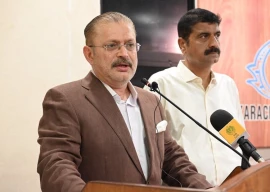

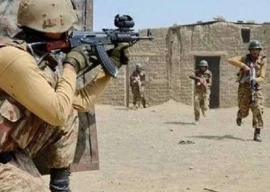

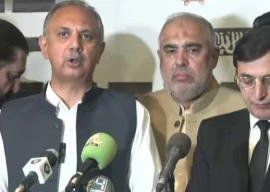

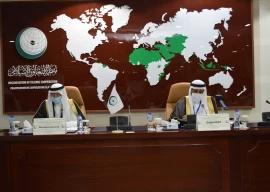
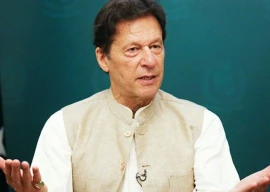
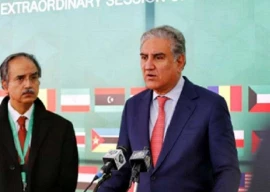




1730706072-0/Copy-of-Untitled-(2)1730706072-0-270x192.webp)
COMMENTS (5)
Comments are moderated and generally will be posted if they are on-topic and not abusive.
For more information, please see our Comments FAQ